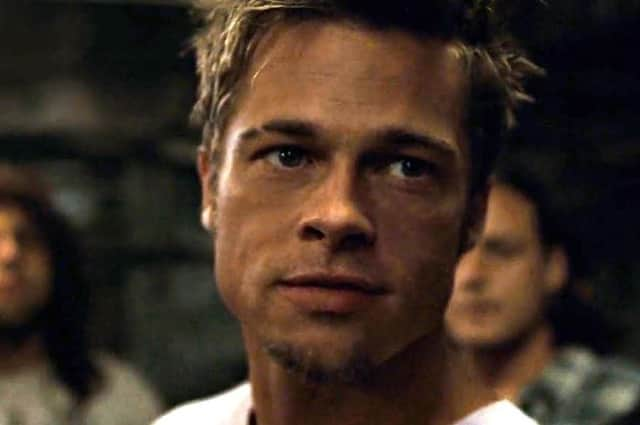NOSTALGIA: The wisdom of Tyler Durden in Fight Club


Now, I know that the first to third rules about Fight Club is that you do not talk about Fight Club, but since to me it is one of the defining movies of the 1990s, I am going to talk about Fight Club.
David Fincher’s 1999 adaptation of Chuck Palahunik’s darkly existentialist novel with Brad Pitt ripped like a god as Tyler Durden, who turns out to be a projection of Ed Norton’s conflicted psyche, and Helena Bonham Carter as the overly xanaxed Marla Singer with a death wish, remains one of my all time favourite films.
Advertisement
Hide AdAdvertisement
Hide AdI’m not down with the violence, or how Fight Club members thrashed each other in near mortal combat, but what I really appreciate about the movie is the way it derides so much of the acquisition of stuff, advertising and capitalist greed that has come to define western civilization, to the point where Ed Norton’s character actually asks himself what kind of Ikea dining set defines him as a person.
He buys more and more Scandi furniture, until he can find no meaning in life, stops sleeping, hates his job, blows up his own flat and has rather profound conversations with Brad’s Tyler, the buffest quasi-philosopher surely in cinematic history in that red leather jacket when he starts on about how ‘the things you own end up owning you’.
Durden eloquently and anarchically dismisses the cultural obsession with celebrity magazines, multiple TV channels, sophisticated solutions to modern living, a designer’s name on your underwear or Martha Stewart, who in her zeal as a home-maker, is more or less polishing the brass on the Titanic, which is all going down, man.
And, as he expatiates in the subterranean hangout where the disenfranchised men meet to physically vent their frustrations at life on each others bruised bodies, sounding like a prophet of the era, telling the gathered congregation that advertising has us doing jobs we hate so that we can buy things we don’t need, and yet as human beings we have so much potential, so much potential, that is so squandered, with the greatest talent of a generation pumping gas, waiting tables, doing mindless white collar jobs that leave them leaden and broken, because really, to again quote Tyler: “Our great war is a spiritual war. Our great depression is our lives.”
Advertisement
Hide AdAdvertisement
Hide AdTo me the film points to the vacuousness of materialist obsession and the serious, screaming void in our culture that could and should be replaced by a renewed emphasis on spirituality and an imperative to ask the deepest questions, moral and metaphysical, rejecting the superficial and daring instead to look into one’s soul to confront the truth of yourself, the world, and the spiritual warfare between the darkness and the light that is lived out within you each day like a personal apocalypse.
‘What can you know about yourself if you’ve never been in a fight?’ asks Tyler.
Well, life is a fight, a battle of will and nerve and conscience you have to boldly pass through with courage and grace so that at the end you can say, if you are lucky, brave, strong-willed and failure is simply not an option you can bear to even consider, that yes, you kept the faith, you stayed the course, you fought the good fight, and never broke the first three rules of Fight Club.
Comment Guidelines
National World encourages reader discussion on our stories. User feedback, insights and back-and-forth exchanges add a rich layer of context to reporting. Please review our Community Guidelines before commenting.